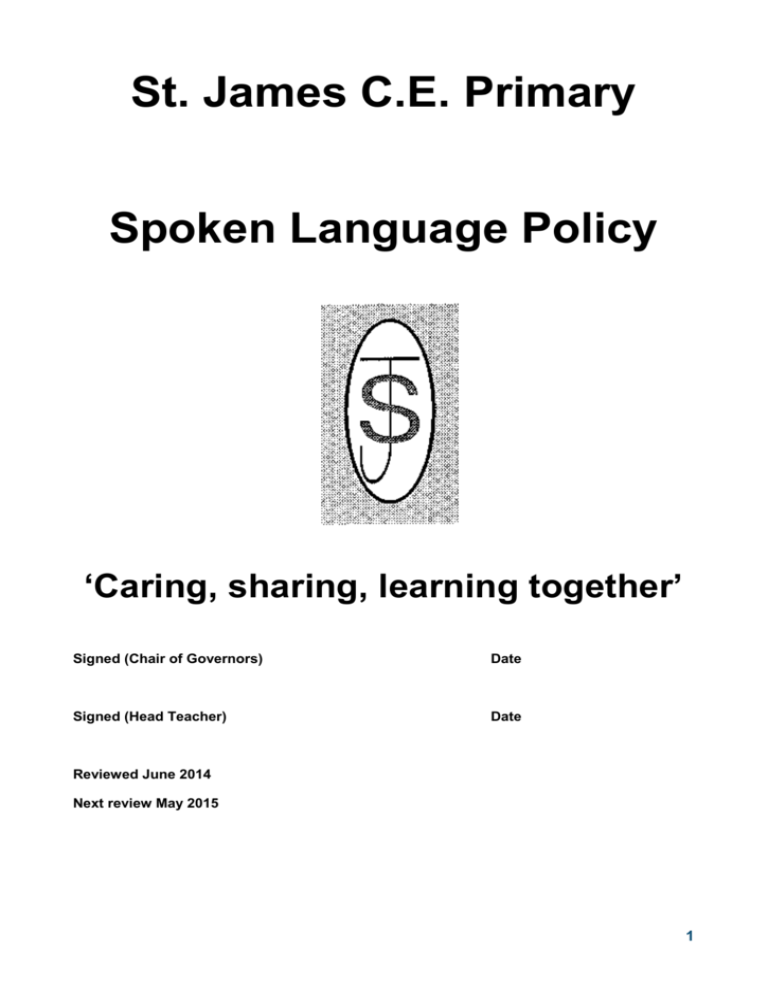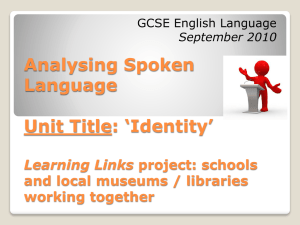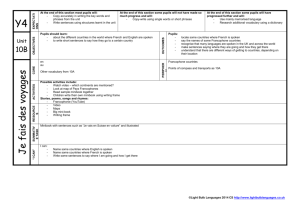Spoken Language Policy - St James CE Primary School, Farnworth
advertisement

St. James C.E. Primary Spoken Language Policy ‘Caring, sharing, learning together’ Signed (Chair of Governors) Date Signed (Head Teacher) Date Reviewed June 2014 Next review May 2015 1 St James CE Primary School Spoken Language Policy Aims and Objectives We believe spoken language to be fundamental to the achievement of the children at St James. A vast majority of our pupils start early school life without the oracy skills relevant for their age. We strive to develop spoken language skills through the taught curriculum, the hidden curriculum, playtimes and lunchtimes, extra-curricular activities and the whole ethos of the school. Respectful and productive relationships between all who form part of the school community are crucial aspects of this ethos. As a staff, we therefore foster good communication amongst ourselves and with our pupils, their parents and carers, and with the wider community. We place a high priority on supporting the development of good speaking and listening skills amongst our pupils. The aims of spoken language are to enable children to: be encouraged to speak with confidence, clarity and fluency; recognise the value of listening; be encouraged to have the self-esteem to be confident in the value of their own opinions and to be able to express them to others; be able to adapt the use of language for a range of different purposes and audiences, including using Standard English; learn to converse, sustain a logical argument and respond to others appropriately; be encouraged to concentrate, interpret and respond appropriately to a wide range of listening experiences; be prepared to be open-minded, to value the contribution of others and to take account of their views; appreciate the diversity of languages, dialects and accents in the school and value the experience and contributions of children with a wide variety of linguistic backgrounds; develop empathy through drama. Teaching and Learning Correct spoken language is fundamental to learning. From the first days in school, speaking and listening play a large part in a child’s progress in all curriculum areas and teachers plan to develop these skills in a wide variety of ways. We aim to develop and encourage fluent speakers, who confident to operate in a wide range of situations. Pupils should have a range of planned oracy experiences (this is not an exhaustive list), which include: drama; circle time; talking partners; story time; guided reading; preparation for writing; visiting speakers; giving and receiving instructions; paired/collaborative work; problem solving in maths; group science experiments; talk-a-bility; floor book activities; presentation of learning; 2 plan, do review sessions in the Foundation Stage; magpie walls to develop vocabulary. It should also be recognised that there are opportunities for children to develop their oracy skills outside of the curriculum. At St James this is promoted through: assemblies, including class assemblies; school council, eco-team, worship team meetings; enrichment events; concerts (by visitors and by children learning instruments); phase productions; talk-a-bility. Teaching and Learning in the EYFS The EYFS provide the building blocks to a child’s spoken language development. The vast majority of our pupils enter our Foundation Stage well below age related expectations for communication and language. It is crucial that staff at this stage provide a wide range of oracy opportunities for pupils. Each pupil in the Foundation Stage takes part in daily ‘Talk-a-bility’ where they are expected to discuss a specific topic. Adults provide ‘power words’ that the children must begin to use in their speech in order to develop vocabulary. Our Foundation Stage pupils are also engaged in the process of ‘Plan, do, review’ where they are expected to speak in a full sentence to report to adults what they have been learning in a particular session. Children also take part in weekly floor book activities where they work together as a group to research a particular question and record the answers they find. This supports vocabulary development and collaborative work. Teaching and Learning in KS1 Each classroom has a magpie display to promote vocabulary development. Children should be taught to undertake relevant paired/group work through ‘Building Learning Power’ strategies; which should also be displayed in each KS1 classroom. Talk-a-bility speech bubbles should be on display to make children aware of the spoken language that will be the focus of correction. As well as the planned and unplanned opportunities mentioned above, KS1 children take it in turns to work on the Learning Bus. This is an opportunity for pupils to work across the three KS1 classes to share and present their learning to each other. KS1 children also develop their vocabulary, collaborative and enquiry skills through floor book activities. Children work together as a group or class to research a particular question and record the answers they find. Teaching and Learning in KS2 Each classroom has a magpie or swag display to promote vocabulary development. Children should be taught to undertake relevant collaborative work through ‘Building Learning Power’ strategies; which should also be displayed in each KS2 classroom. Talk-a-bility speech bubbles should be on display to make children aware of the spoken language that will be the focus of correction. As well as the planned and unplanned opportunities mentioned above, KS2 children take it in turns to work in the Learning Lounge. This is an opportunity for pupils to work across KS2 to share and present their learning to each other. KS2 children also develop their vocabulary, collaborative and enquiry skills through floor book activities. Children work together as a group or class to research a particular question and record the answers they find. 3 Learning Environment Each classroom has a magpie or swag display to promote vocabulary development. Children should be taught to undertake relevant paired/collaborative work through ‘Building Learning Power’ strategies; which should also be displayed in each classroom. Talk-a-bility speech bubbles should be on display to make children aware of the spoken language that will be the focus of correction. Staff should also have a set of small talk-a-bility speech bubbles on their person to assist pupils in correcting their use of Standard English. Parental Involvement Parental involvement is encouraged in all aspects of school life. Parents are informed of any issues related to spoken language through parents evenings or as and when necessary. Parents will also be signposted to the relevant outside agencies to support their children at home with speaking and listening. Speech therapy activities are sent home for children who need them. Assessment Children in EYFS are continually observed and assessed against the Early Years Profile and Development Matters criteria in Communication and Language. Data is collected at the end of the year to help complete the Early Years Profile. This is submitted to the LA. Teachers in KS1 & 2 assess children’s abilities and progress in spoken language regularly through formative assessment. Adults should use the end of year or unit expectations in the National Curriculum 2014 to decide whether a child is performing at an age related expectation. Inclusion Children with additional needs are encouraged to take a full and active part in spoken language activities at a level appropriate for their needs. Some of our children have weekly input from a speech therapist, and we welcome the expertise they bring to the school. Targets are usually set which are then worked on individually or in small groups. As a school we have a growing number of pupils who have English as an additional language. Their experiences and knowledge provide us with a rich resource on which to draw for the benefit of the whole St James’. Visual prompts and signs written in the child’s first language may be used to develop vocabulary and encourage participation. Our experienced TAs work with individuals or groups of children specifically in the areas of speaking, listening and collaboration. Sometimes this may be to address an issue such as elective mutism, at other times it may be to encourage social skills. We acknowledge in school that there will be some children who will be working below the age related expectations cited in the National Curriculum 2014, and there will be some children who are working above their age related expectation. Their needs will be addressed accordingly. Roles and Responsibilities The English Subject Leader, SLT, Head teacher and link Governors will be responsible for monitoring the impact of this policy, and standards of spoken language across the school, through 4 work scrutiny, planning scrutiny, drop in observations and lesson observations and any other relevant monitoring activities. It is every class teacher’s responsibility to ensure that this policy is adhered to. Appendix 1 National Curriculum Expectations for Spoken Language 5 Spoken language – years 1 to 6 Statutory requirements Pupils should be taught to: listen and respond appropriately to adults and their peers ask relevant questions to extend their understanding and knowledge use relevant strategies to build their vocabulary articulate and justify answers, arguments and opinions give well-structured descriptions, explanations and narratives for different purposes, including for expressing feelings maintain attention and participate actively in collaborative conversations, staying on topic and initiating and responding to comments use spoken language to develop understanding through speculating, hypothesising, imagining and exploring ideas speak audibly and fluently with an increasing command of Standard English participate in discussions, presentations, performances, role play, improvisations and debates gain, maintain and monitor the interest of the listener(s) consider and evaluate different viewpoints, attending to and building on the contributions of others select and use appropriate registers for effective communication. Notes and guidance (non-statutory) These statements apply to all years. The content should be taught at a level appropriate to the age of the pupils. Pupils should build on the oral language skills that have been taught in preceding years. Pupils should be taught to develop their competence in spoken language and listening to enhance the effectiveness with which they are able to communicate across a range of contexts and to a range of audiences. They should therefore have opportunities to work in groups of different sizes – in pairs, small groups, large groups and as a whole class. Pupils should understand how to take turns and when and how to participate constructively in conversations and debates. Attention should also be paid to increasing pupils’ vocabulary, ranging from describing their immediate world and feelings to developing a broader, deeper and richer vocabulary to discuss abstract concepts and a wider range of topics, and to enhancing their knowledge about language as a whole. Pupils should receive constructive feedback on their spoken language and listening, not only to improve their knowledge and skills but also to establish secure foundations for effective spoken language in their 6 Notes and guidance (non-statutory) studies at primary school, helping them to achieve in secondary education and beyond. 7






![afl_mat[1]](http://s2.studylib.net/store/data/005387843_1-8371eaaba182de7da429cb4369cd28fc-300x300.png)

